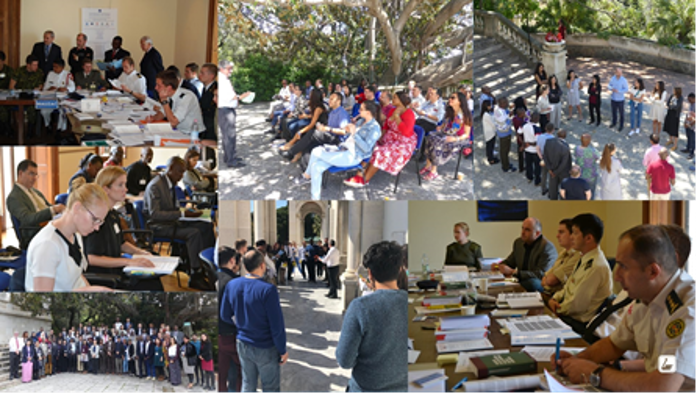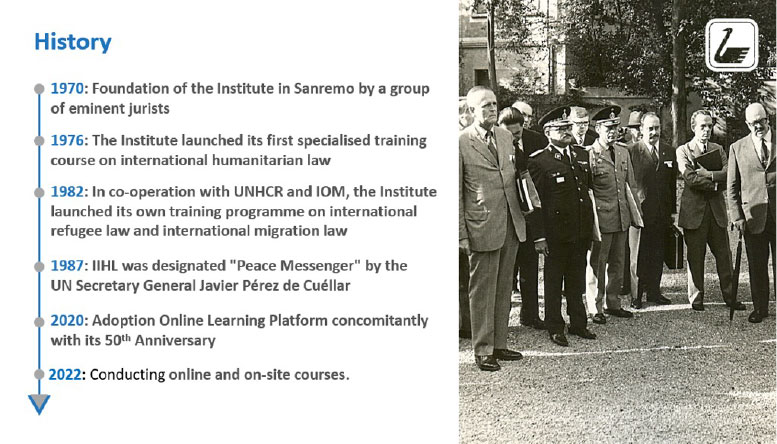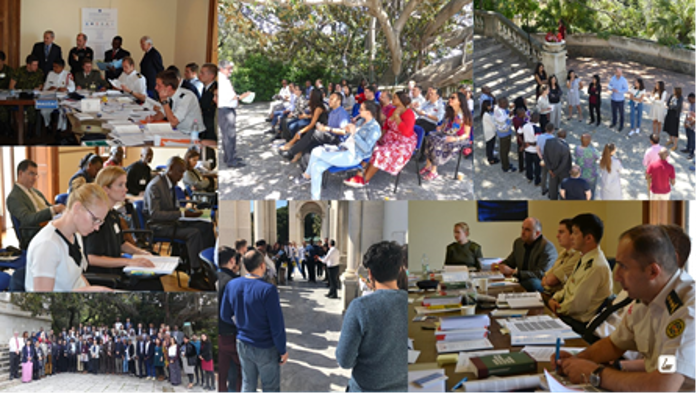The International Institute of Humanitarian Law

Overview of a Humanitarian Institution
Historical Background
The International Institute of Humanitarian Law was established in September 1970 in Sanremo, Italy, by a group of eminent lawyers and experts from all over the world.
The choice of this town as the seat of the Institute was not fortuitous at all, being motivated by different environmental and historical factors.
Sanremo’s mild climate and pleasant landscape, determined by the Maritime Alps behind and the Mediterranean Sea in front, contributed to the 19th century to the conversion of the city into the capital of the Italian Riviera, a privileged destination of illustrious Italian and foreign dignitaries among whom Queen Victoria, Victor Emanuel II, the Empress of Russia, mother of Czar Nicolas II, and William Frederick the Prince Heir of Germany. Impressed by the calm, healthy and colourful environment, many of them even decided to build beautiful villas, as happened in the case of the famous Swedish scientist Alfred Nobel, who moved to Sanremo where he decided to live the last years of his life. In his villa in front of the sea, he conceived, for example, his famous testament, which established the annual prize for the honourable persons who had rendered the biggest services to humankind in various domains, with particular reference to those who “most or best operated for the brotherhood of peoples or for the reduction of permanent armies, as well as for the creation and dissemination of peace conferences”.
At the beginning of the 20th century, Sanremo and its Riviera, thus had reached its highest splendour, globally well-known as a privileged location for wealthy tourists. Against this background, Sanremo and the Riviera played a key role in international politics before the beginning of World War I, offering Heads of State, governmental representatives, ministries, and other political and diplomatic authorities an opportunity to exchange views formally or informally, by relying on the relaxing privacy of their big hotels and mansions.
It is, therefore, not by chance that after the First World War, the town was selected to host one of the most important peace conferences, which dealt with several questions concerning the collapse of the Ottoman Empire.
Hence, in light of all the aforementioned reasons and historical facts, it is beyond doubt that Sanremo has very deep roots in the effort to build peace and foster humanitarianism at the global level.
To this calling, the existence and the activities of the Institute in Sanremo may be connected.
The International Institute of Humanitarian Law

The International Institute of Humanitarian Law is a private, independent, and non-profit organisation, whose primary objective is to promote the development, application and dissemination of international humanitarian law (IHL), international human rights law, international refugee law and many other related fields, thus contributing to the safeguard and protection of the most vulnerable categories of people in humanitarian crises.
International Humanitarian Law encompasses all the rules, provisions, practices and efforts that aim at alleviating human suffering in armed conflict. The Institute constitutes a neutral forum favouring reflection, discussion, and exchange of knowledge, views and experiences, as well as an entity where research and new approaches in this field are promoted. As an independent organisation, the Institute especially encourages dialogue among governments, organisations and humanitarian institutions, as well as individual experts. For more than 50 years now, the Institute has addressed a broad range of subjects regarding the law of armed conflict and its implementation. This, by showing how IHL, the law of human rights, refugee law and many other branches of public international law are interrelated and should complement each other to protect the civilian populations and the most vulnerable persons.
Thanks to its specific, well-tested experience, the Institute has earned an international reputation as a centre of excellence in the field of training, research, and the dissemination of all aspects of international humanitarian law.
Given its objectives, the Institute develops its initiatives in cooperation with many international organisations, particularly those mandated by the international community to engage in humanitarian action, such as the International Committee of the Red Cross and the whole International Federation of Red Cross and Red Crescent. In addition, the Institute co-operates with a number of UN agencies, non-governmental organisations and academic institutions, such as the United Nations High Commissioner for Refugees (UNHCR), the International Organization for Migration (IOM), NATO, OSCE and OIF (Organisation International de la Francophonie). IIHL has consultative status with the United Nations (ECOSOC) and participatory status with the Council of Europe.
It is finally key to stress that more than 50 years of meetings under the auspices of the Institute and in conjunction with its intense activity carried out on the training and academic levels, have contributed to giving life to what is globally recognised as the "humanitarian dialogue in the spirit of Sanremo".
Operationally speaking, the Sanremo Institute is structured into three distinct Departments. These include the Military Department, focused on IHL/Law of Armed Conflict (LOAC) at different levels; the Refugee Law and Migration Law Department, addressing the legal frameworks governing human movements and all its associated matters; and the Special Projects Department, tasked with managing complementary initiatives ranging from training to awareness-raising and research in the fields of IHL, Human Rights, and many other related areas. Altogether, these three units contributed in 2023 to the organisation of more than 70 initiatives engaging around 3.000 participants representing 156 countries.
The Swan, Symbol of the Institute

Across cultures, the swan historically represents beauty, elegance, love and peace.
The swan was taken as a symbol of the Institute in homage to the land of Liguria. According to Greek mythology, Cycnos, legendary king of the Ligurians, was transformed into a swan by Apollo, Greek god of the Sun, while he was mourning the death of his friend Phaeton, who was electrocuted by Zeus for driving the Sun chariot then falling into the Eridanus River.
Cycnos’ metamorphosis was celebrated by the Latin poet Ovid and was mentioned by Virgil in the tenth book of the Aeneid. The unfortunate king in his new form thus became the emblem of the region over which he had reigned.

The Military Department: Military Courses on the Law of Armed Conflict (LOAC)
There are very few institutions in the world that can boast the ability to gather together officers from almost every corner of the world, who, regardless of their uniform and affiliation, are called to live and work together for two or three weeks. One of these is the International Institute of Humanitarian Law.
In order to help governments to come to terms with their obligation of ensuring respect for the law of armed conflict within their armed forces, in 1976 the Institute indeed started a regular programme of military courses. Since then, in collaboration with the International Committee of the Red Cross, governments and other relevant organizations, the Military Department structures its training to emphasize – and develop progressively – the knowledge and practical application of IHL.
The courses address military officers of all services, normally of senior rank and/or holding command responsibilities, along with legal officers and civilians responsible for the application, implementation and dissemination of the law of armed conflict.
The Department organises its activities at three levels:
1. IHL Foundation Courses presenting to the participants a practical and operational introduction to the Law of Armed Conflict.
2. Advanced Courses on IHL, specifically designed for experienced military and civilian legal advisers, providing them with an in-depth knowledge of LOAC.
3. Specialised Courses offering an enhanced practical understanding of specific areas of IHL.
Workshops on IHL emphasizing the exchange of views and experiences between practitioners and experts, as well as the sharing of different national approaches.
Due to the ever-increasing demand for awareness-raising and capacity-building in the field of IHL, the courses are delivered in 7 different languages: English, French, Spanish, Portuguese, Arabic, Russian and Chinese.
During the pandemic military training courses were specifically designed for the online environment and while 2022 has seen a return to courses in Sanremo these online activities will continue to complement those held at the Institute. The Military Department is also capable of delivering courses in other locations, in Italy and abroad.
Department of Refugee Law and Migration Law: Protecting People Fleeing Crises Through Training
Since 1982, through its capacity-building program, the Department of International Refugee Law and Migration Law has aimed to advance the knowledge and skills of government and civil society officials, as well as military personnel, engaged in the protection of forcibly displaced and stateless persons worldwide.
As the leading capacity-building partner of the United Nations High Commissioner for Refugees and the International Organization for Migration, the Department has been proudly contributing to their mandates by promoting international law, policies, and best practices for safeguarding and upholding the human rights of persons in need of protection.
The Department’s Courses are currently delivered by a selection of more than 160 international experts and conducted in 5 different languages (English, French, Spanish, Arabic, and Russian) across 4 time zones. These figures, along with its distinctive interactive and innovative teaching methodology, place the Department at the forefront in the designing and implementation of global capacity-building programs on International Refugee Law, International Migration Law, Internal Displacement, and Statelessness.
The Department finally is a proactive and recognised advocate of the Global Compact on Refugees and the Global Compact for Migration and has made pledges at the International Migration Review Forum and the Global Refugee Forum.
Special Projects Department: One Foot in the Past, Both Eyes to the Future
The establishment of the Special Projects Department (SPD) was a strategic response to the reorganisation that occurred at the Sanremo Institute after the Covid19 outbreak. The main task of the Department is to conceptualise, design, and implement a range of complementary initiatives with the main goal of furthering the institutional mission of the Institute and enhancing its international standing as a distinguished center of excellence.
To pursue its objectives, the SPD is responsible for the development of several initiatives, with the annual Sanremo Round Table on current issues of International Humanitarian Law certainly being the most prominent among them. Additionally, the Department counts a range of consolidated activities that constitute the backbone of its annual work calendar.
These activities encompass the Proyectos Especiales y Actividades de Capacitación para Latinoamérica, which includes tailored training and awareness programs designed specifically for the Spanish-speaking audience in Latin America. The Sanremo Summer School, fully renewed to become a unique study opportunity of all the key domains addressed by the Institute and their complex interconnections. The Diplôme Universitaire en Droit International Humanitaire, conducted in collaboration with the Institut de la Paix et du Développement of the Université Côte d'Azur (France). The International Disaster Law Course, which aims to provide a comprehensive understanding of international law norms applicable to disaster prevention, management, and relief operations.
In addition to the aforementioned initiatives, the SPD sees the continuous establishment of new partnerships with national and international organisations as an essential reason for its existence. This strategic endeavour responds to the need to enhance the IIHL reputation within the global community of specialised entities dedicated to promoting the principles and rules of IHL, particularly by designing specific thematic courses and projects focusing on their respect in the framework of relevant subjects such as Gender and Cultural Property Protection.
Finally, the SPD engages actively in multi-stakeholder projects centred on important areas such as citizenship and peace education, intercultural dialogue, and providing institutional support for the creation of innovative integration policies.
Sanremo Round Table on Current Issues of IHL: The Flagship Event of the IHL Year
In the period between 1974 and 1977 the International Institute of Humanitarian Law, through the organisation of a series of informal meetings of experts in Sanremo, contributed to the success of the “Geneva Diplomatic Conference on the reaffirmation and development of international humanitarian law applicable in armed conflicts”, which led to the drafting of the two Additional Protocols to the Geneva Conventions in 1977. This contribution was much appreciated by governments and was acknowledged by governmental representatives at the final session of the Conference.
As a result of this initiative, the Sanremo Round Table on current issues of International Humanitarian Law is organised annually in Sanremo, becoming very soon the flagship event of the Institute. The Sanremo Round Table offers a forum for dialogue and key reflection on the most current issues of international humanitarian law and has indeed gradually become an appreciated appointment for the international and global community of experts and practitioners.
For almost 50 years now, the Round Table has allowed personalities from the scientific, diplomatic, institutional and military worlds to meet periodically and informally in Sanremo to discuss in depth, and from their different perspectives, the most topical issues related to the promotion, respect and evolution of IHL.

